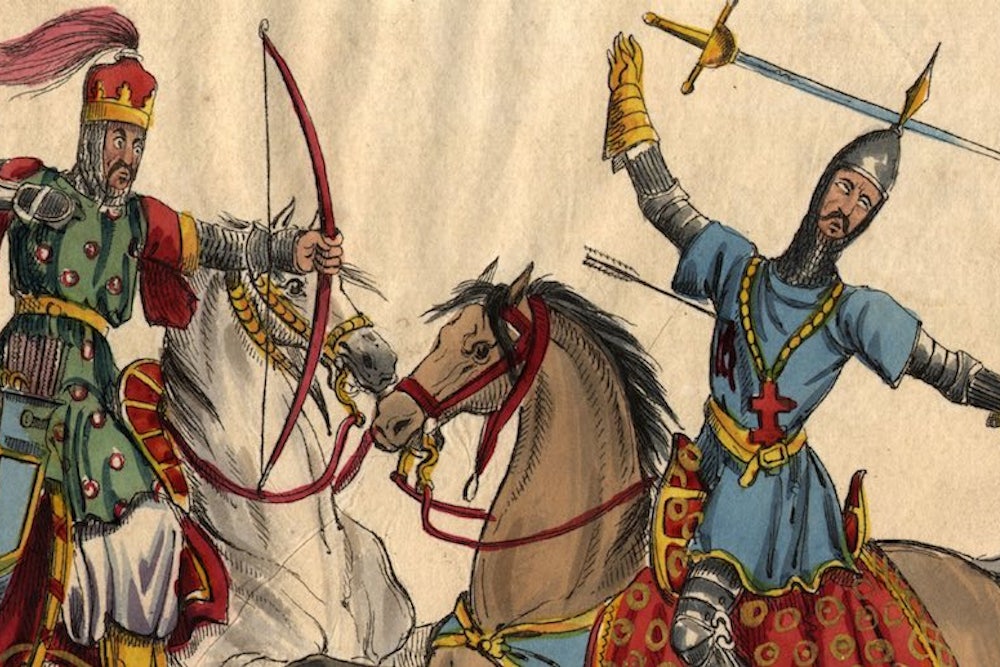After President Barack Obama noted during last week's National Prayer Breakfast that Christians have committed acts of violence in the name of Christianity, there are a lot of directions conservatives could have gone. The sanest direction would have been to accept that Christians have done terrible things under the banner of faith—even religions we find familiar and comforting can be contorted under the right conditions. This was undoubtedly the point the president was attempting to make, in an effort to maintain some semblance of fairness as he addressed the problem of Islamic terrorism.
Instead, conservatives tried to defend the Crusades; or rather, to defend the symbol the Crusades have become as they have been imported into the American cultural lexicon. At National Review Online, a popular conservative blogging platform, Jonah Goldberg argued that the Crusades were essentially justified in the context of what he identifies as Muslim aggression. “For starters,” Goldberg writes, “the Crusades—despite their terrible organized cruelties—were a defensive war.” Note that the plural “Crusades” transforms by the end of the sentence into the singular “a … war”: Goldberg was closer to the mark at the start of the sentence than at the end, as there were multiple Crusades, and each of them were distinct affairs. Some, for example, were initiated by the papacy; others were initiated by kings against the wishes of the Church, and some, like the Children's Crusade, now appear to be at least somewhat mythological.
More slippery is the tantalizingly italicized word “defensive,” which conservatives also periodically apply to the Civil War with similar intentions of historical whitewashing. As David Perry points out at The Guardian, a host of other conservative defenses of the Crusades have accompanied Goldberg’s: from spirited justifications to softer arguments. Louisiana Governor Bobby Jindal’s claim, for instance, was that the Crusades happened so long ago as to be irrelevant in all modern contexts, and that the time spent discussing them in Obama's speech could have been put to better use combatting ISIS.
One could interpret these bizarre defenses as evidence that, for a certain brand of Christian, the fact that Christians can and do pervert religion in the service of evil deeds is literally unbelievable. But this would seem a remarkable stretch, given that even Judas Iscariot has a place in the Christian economy of salvation. In other words, Christians can usually fathom, when thinking rationally, the idea that terrible things are a part of our collective history.
Perhaps conservatives merely found the criticisms of the Crusades cynical, given that their historical distance makes any genuinely felt implication on the president’s behalf unlikely. In this case, the defense of the Crusades reads as a reflexive measure, meant to press Obama into more compromising territory, where he might have the courage to remark on a Christian atrocity he himself feels guilty about. Yet it seems unlikely to me that offering examples of more recent Christian evils—such as racism and slavery, the conquest of the Americas, the Bosnian War, or complicity in the Rwandan Genocide—would have won Obama any points for sincerity. Each would most likely be respectively dismissed as race baiting, as anti-American, as arguably legitimate, and as irrelevant.
It’s likeliest that the conservative defense of the Crusades is directly related to their status as a touchstone of American civic religion. Pope Francis was to be accused of crusading after he nodded to the use of limited force in restraining ISIS; a look back at Ridley Scott’s 2005 Crusade epic Kingdom of Heaven reveals that the film sparked a very similar debate to the one we’re having now, though that one was somewhat less heated.
When the Crusades are represented in American culture now, they are a symbol of Christian gusto, whether positive or negative. They resonate with the idea of a robust, aggressive Christianity, a faith with the masculine energy to face Islam head-on. This is why the Crusades occupy a special place in the conservative id, and it is why conservatives appear willing to defend them on general principle, with little regard for historicity. It is also why criticizing the Crusades is presented by some conservatives as an alternative to fighting ISIS, as though if Obama had simply omitted that remark from his speech at the National Prayer Breakfast, the Islamic terror group would now be vanquished.
Of course, no remark made at that breakfast, or any other breakfast, will be sufficient to undo the brutality ISIS has already inflicted upon innocent people. Nor will feverish dreaming about a mythological Christian military history rooted in contemporary American appropriations of the past advance that goal. Obama’s remark was meant to cool interfaith hostilities by pointing out no religion has perfect adherents; his political opponents have instead decided to double down on the misuse of Christian sentiment the president intended to point out, which, if nothing else, is proof of the worthiness of his remark.
